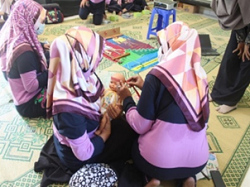Peningkatan Keterampilan Kader Posyandu dalam Memantau Pertumbuhan Anak Balita pada Masa Pandemi Covid 19 Increasing of Posyandu Cadres’ Skills in Monitoring the Growth of Toddlers during the Covid-19 Pandemic
Main Article Content
Abstract
The Covid-19 pandemic has resulted in the cessation of implementing the Integrated Healthcare Center (Posyandu) program in Wonokromo 1, Wonokromo, Pleret Bantul. In contrast, the early period of life, including infancy and children, is a critical period of body and brain growth. Any nutritional problems could lead to serious nutritional problems and low intelligence. Therefore, this service program aims to optimize posyandu activities by arranging the training for cadres to support toddlers’ growth in the Covid-19 pandemic era. The training included anthropometric measurements and analysis of growth charts for children under five for posyandu’s cadres. This activity was attended by 15 posyandu cadres and delivered by using discussion, simulation, and demonstration methods. It was found that the cadres still made some mistakes in measuring weight, body length, height, and head circumference, so they were given a demonstration of the correct measurement methods. The cadres are also trained to interpret the data in growth charts and explain their follow-up. The result of this activity is the enhancement in knowledge and skills in anthropometric measurements and growth charts interpretation by Posyandu’s cadres obtained from written tests and direct observations of the anthropometric measurements process and growth charts interpretation. It is expected that this activity will assist cadres in getting the correct measurement results to detect nutritional problems in toddlers quickly and accurately. Thus, they can be handled immediately and not cause severe dietary issues.
Downloads
Article Details
Authors who publish with this journal agree to the following terms:
- Any article on the copyright is retained by the author(s).
- Author grant the journal, right of first publication with the work simultaneously licensed under a Creative Commons Attribution License that allows others to share work with acknowledgment of the work authors and initial publications in this journal.
- Authors are able to enter into a separate, additional contractual arrangements for non-exclusive distribution of published articles of work (eg, post-institutional repository) or publish it in a book, with acknowledgment of its initial publication in this journal.
- Authors are permitted and encouraged to post their work online (e.g., in institutional repositories or on their websites) prior to and during the submission process, as can lead to productive exchanges, as well as earlier and greater citation of published work.
- The article and any associated published material is distributed under the Creative Commons Attribution-ShareAlike 4.0 International License
References
Beal, T., Tumilowicz, A., Sutrisna, A., Izwardy, D., Neufeld, L.M. 2018. A review of child stunting determinants in Indonesia. Maternal and Child Nutrition. 14(4)e12617. https://doi.org/10.1111/mcn.12617
Evita, D., Mursyid, A., Siswati, T. 2016. Pelatihan meningkatkan pengetahuan dan keterampilan kader puskesmas dalam penerapan standar pemantauan pertumbuhan balita di Kota Bitung. Jurnal Gizi dan Dietetik Indonesia (Indonesian Journal of Nutrition and Dietetics). 1(1):15-21. https://doi.org/10.21927/ijnd.2013.1(1).15-21
Fink, G., Levenson, R., Tembo, S., Rockers, P.C. 2017. Home- and community-based growth monitoring to reduce early life growth faltering: An open-label, cluster-randomized controlled trial. American Journal of Clinical Nutrition. 106(4):1070–1077. https://doi.org/10.3945/ajcn.117.157545
Kementerian Kesehatan Republik Indonesia. 2018. Hasil Utama Riskesdas 2018. https://www.litbang.kemkes.go.id/hasil-utama-riskesdas-2018/
Khoirunisa, E., Karsidi, R., Yusuf, M. 2019. The Role of Posyandu as Primary Health Care Services in Implementing Early Detection and Intervention for Autistic Children in Indonesia. International Journal of Multicultural and Multireligious Understanding. 6(1):101-109. https://doi.org/10.18415/ijmmu.v6i1.511
Lubis, Z., Syahri, I. M. 2015. Pengetahuan Dan Tindakan Kader Posyandu Dalam Pemantauan Pertumbuhan Anak Balita. Jurnal Kesehatan Masyarakat. 11(1):65-73. https://doi.org/10.15294/kemas.v11i1.3473
Luthfa, I. 2019. Revitalisasi Posyandu sebagai upaya peningkatan kesehatan anak dan balita di Posyandu Manggis Kelurahan Karang Roto Semarang. Indonesian Journal of Community Services. 1(2):202-209. https://doi.org/10.30659/ijocs.1.2.202-209
Migang, Y.W., Manuntung, A. 2021. Pencegahan Stunting pada Balita dengan Membuat Raport Gizi sebagai Screening pada Lembaga Pendidikan Anak Usia Dini (PAUD). JPKM : Jurnal Pengabdian Kesehatan Masyarakat. 1(2):84–91. https://doi.org/10.37905/jpkm.v1i2.10436
Noordiati, N. 2020. Peningkatan Kapasitas Kader Posyandu Melalui Pelatihan Pemantauan Pertumbuhan dan Perkembangan Balita di Wilayah Kerja Puskesmas Kereng Bangkirai Kecamatan Sebangau Palangka Raya. PengabdianMu: Jurnal Ilmiah Pengabdian Kepada Masyarakat. 5(4):328–335. https://doi.org/10.33084/pengabdianmu.v5i4.1345
Nugroho, A., Rahayu, S., Manikam, R.M. 2020. E-Posyandu for Posyandu cadres report. International Journal of Open Information Technologies. 8(10):77–83
Nurhidayah, I., Hidayati, N.O., Nuraeni, A. 2019. Revitalisasi Posyandu melalui Pemberdayaan Kader Kesehatan. Media Karya Kesehatan. 2(2):145–157. https://doi.org/10.24198/mkk.v2i2.22703
Riawati, D., Sari, A.N. 2019. Analisis Faktor Keteraturan Kunjungan Posyandu Balita Dan Status Gizi Balita Berdasarkan Berat Badan/Umur. Jurnal Kebidanan Indonesia. 10(1):137–146. https://doi.org/10.36419/jkebin.v10i1.252
Setiawan, A., Christiani, Y. 2018. Integrated Health Post for Child Health (Posyandu) As A Community-Based Program in Indonesia: An Exploratory Study. Jurnal Keperawatan Indonesia. 21(3):150–158. https://doi.org/10.7454/jki.v21i3.600
Susanto, T., Yunanto, R.A., Rasny, H., Susumaningrum, L.A., Nur, K.R.M. 2019. Promoting Children Growth and Development: A community-based cluster randomized controlled trial in rural areas of Indonesia. Public Health Nursing. 36(4):514–524. https://doi.org/10.1111/phn.12620
Thamaria, N. 2017. Penilaian Status Gizi. Jakarta: Badan Pengembangan dan Pemberdayaan Sumber Daya Manusia Kesehatan Kementerian Kesehatan Republik Indonesia.
Tiwari, K., Goyal, S., Malvia, S., Sanadhya, A., Suman, R.L., Jain, R. 2017. Impact of malnutrition on head size and development quotient. International Journal of Research in Medical Sciences. 5(7):3003. https://doi.org/10.18203/2320-6012.ijrms20172977
Tumbelaka, P., Limato, R., Nasir, S., Syafruddin, D., Ormel, H., Ahmed, R. 2018. Analysis of Indonesia’s community health volunteers (kader) as maternal health promoters in the community integrated health service (Posyandu) following health promotion training. International Journal of Community Medicine and Public Health. 5(3):856-863. https://doi.org/10.18203/2394-6040.ijcmph20180462
UNICEF. 2020. Situasi Anak di Indonesia - Tren, Peluang, dan Tantangan dalam Memenuhi Hak-hak Anak. Jakarta: UNICEF Indonesia.
